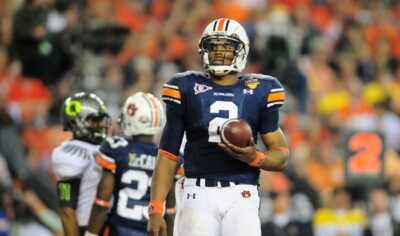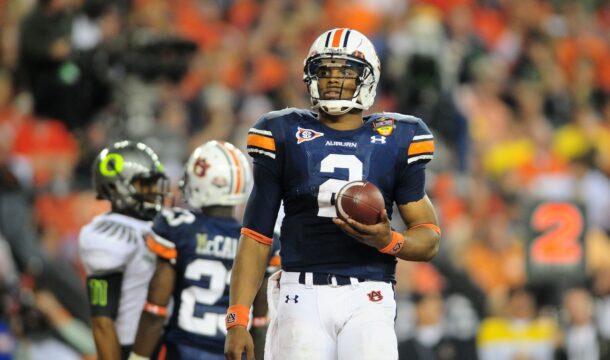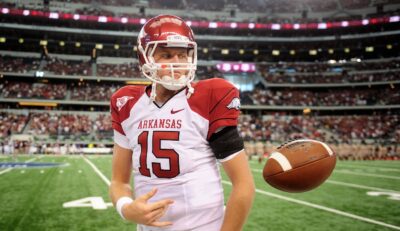
David Pollack’s transfer portal issues are legitimate, but there are a couple holes in his argument
The transfer portal drives David Pollack nuts.
Those are his words, not mine, though I did recently write about a couple of tweaks that I’d make to it. In a recent interview with DawgNation.com, the ESPN analyst shared his displeasure of college football’s newest craze.
“I think the people at the NCAA need to have some more consistency,” Pollack told Dawg Nation. “The transfer thing drives me nuts …”
Pollack continued by sharing his frustration about how a pair of former Georgia players showed the flaws in the transfer portal as it relates to the NCAA. While former Georgia quarterback Justin Fields was granted immediate eligibility to play at Ohio State, tight end Luke Ford had his waiver for immediate eligibility denied by the NCAA.
“Fields versus Luke Ford, guys that were at Georgia, what determines who gets it (immediate eligibility)?” Pollack told Dawg Nation. “Somebody’s family is sick (Ford’s grandfather), or somebody has a reason to go back home and they get a ‘no,’ and somebody else that doesn’t really have a reason gets a ‘yes.’ That drives you nuts for the kids.
“Some people get waivers, some people don’t, and it makes absolutely no sense.”
On that point, Pollack is dead on. If there’s been a takeaway from the beginnings of the transfer portal, it’s that high-profile cases seemingly are given special treatment when it comes to granting immediate eligibility. If more analysts and former players voice their frustration with that element of the process, we’d have a better chance of seeing some of the needed modifications the Pollack referenced (concrete rules or a voting system).
But there was something else that Pollack said that didn’t sit well with me.
“I’m more about stay and fight, so Justin Fields, I don’t get that,” Pollack said. “I get that Jake Fromm is really good, but I’m the type of person, I never thought about running from competition. I always thought about competing and getting better, so I think it’s kind of a strange situation.”
I don’t want Georgia fans to take what I’m about to say as some “Justin Fields should be able to do whatever he wants” argument. I’m on record saying I thought at the root of Fields transferring was him completely ignoring how good Fromm was, and that it was strange how he overlooked the dude who led the program to its first national championship game since 1980. Like, did Fields really think coaches were going to watch you in practice and be like, “yeah, he’s our guy now.”
That’s why I have the problem with the “Fields ran from competition and I wouldn’t have” point that Pollack made.

As it relates to Fields, it wasn’t a true competition. The only things that would have forced the coaching staff to take the job from Fromm would have been a Jacob Eason-like injury in which Fields stepped in and dominated, or if Fromm repeated his LSU dud for another game or two.
There was nothing that Fields could have done in practice to have changed that. Could Fields have stayed and been ready to take advantage of the situation if one of those scenarios played out? Sure. But whether you agree with the decision or not, he saw the writing on the wall. Fromm was going to be the guy and Fields would have to wait for a lucky break or for Fromm to leave for the NFL in 2020 at the earliest.
It’s different at the quarterback position than say, defensive end, where Pollack starred. As we know, teams have 2 who start and usually 3 or 4 who play meaningful snaps on a given fall Saturday. And even for defensive linemen who don’t start, they could be stuck behind a pair of All-SEC players and decide that they need to find another path to more playing time.
Pollack’s sentiment feels almost like a my generation vs. your generation argument, and that frustrates me because there are different factors at play. Pollack’s generation didn’t have the transfer portal. It didn’t have a system that’s more conducive than ever to mobility. The painstaking process used to require a coach’s permission, complete with a list of restricted transfer destinations and there was no decision to be made about immediate eligibility. To think that players from Pollack’s generation wouldn’t have taken advantage of that is ridiculous.
If we’re going to look at the high transfer numbers as an indictment on kids’ desires to battle for positions, we’re painting with too broad of a brush. There are definitely situations like that. But Fields’ transfer, in my opinion, was more about not wanting to wait for his chance than it was about a lack of desire to compete. Those are different things. We can’t forget that.
And the other part of this that people making Pollack’s argument will ignore is that there are more true freshmen than ever starring in college football.
As USA Today pointed out, from 2000-12, only 1 non-junior/senior starting quarterback won a national title (A.J. McCarron was a sophomore in 2011). Even Tim Tebow, arguably the best college football player of the 21st century, didn’t start as a true freshman for that title team in 2006, though he obviously contributed. In the past 3 national championship games, 3 true freshmen started, not including Tua Tagovailoa’s relief efforts to claim the 2017 title.
It’s not just a quarterback thing, either.
“I don’t think there’s any question about the fact that the narrative has changed relative to young players playing,” Nick Saban told USA Today in 2018. “Now, especially at skill positions, guys make an impact.”

So if more underclassmen players than ever are playing, doesn’t it make sense that there are more transfers than ever? Sure, maybe part of that was the result of certain upperclassmen not competing hard enough before the younger players came in and won starting jobs. But does that mean the upperclassmen should stick around and drain the rest of their college eligibility while someone younger than them starts?
If you really wanted to, you could dig into the fact that there’s now more guaranteed money than ever available in the NFL, and how with all of these TV deals for Power 5 conferences, today’s generation has more chances for national exposure than Pollack’s did. You know, if they play.
(By the way, each of the past 2 Heisman Trophy winners/No. 1 overall draft picks were quarterbacks who left their schools after their freshmen seasons, which wasn’t a product of them “not wanting to compete,” but rather them seeing the writing on the wall.)
Don’t get me wrong. I get why Pollack and others would be irked to see more kids than ever transfer. Pollack worked his tail off for everything he got, and his mindset fueled him to become one of the SEC’s best defensive players of all-time. I respect his opinion as someone who has gone through that process, and I agree with him completely that the NCAA needs to rethink the way the subjective manner in which it handles immediate eligibility.
But if we’re going to criticize the motives behind the influx in transfers because of the portal, let’s make sure we’re keeping some context, both present and historical.
And if we don’t, well, that’ll drive me nuts.
Connor O'Gara is the senior national columnist for Saturday Down South. He's a member of the Football Writers Association of America. After spending his entire life living in B1G country, he moved to the South in 2015.







